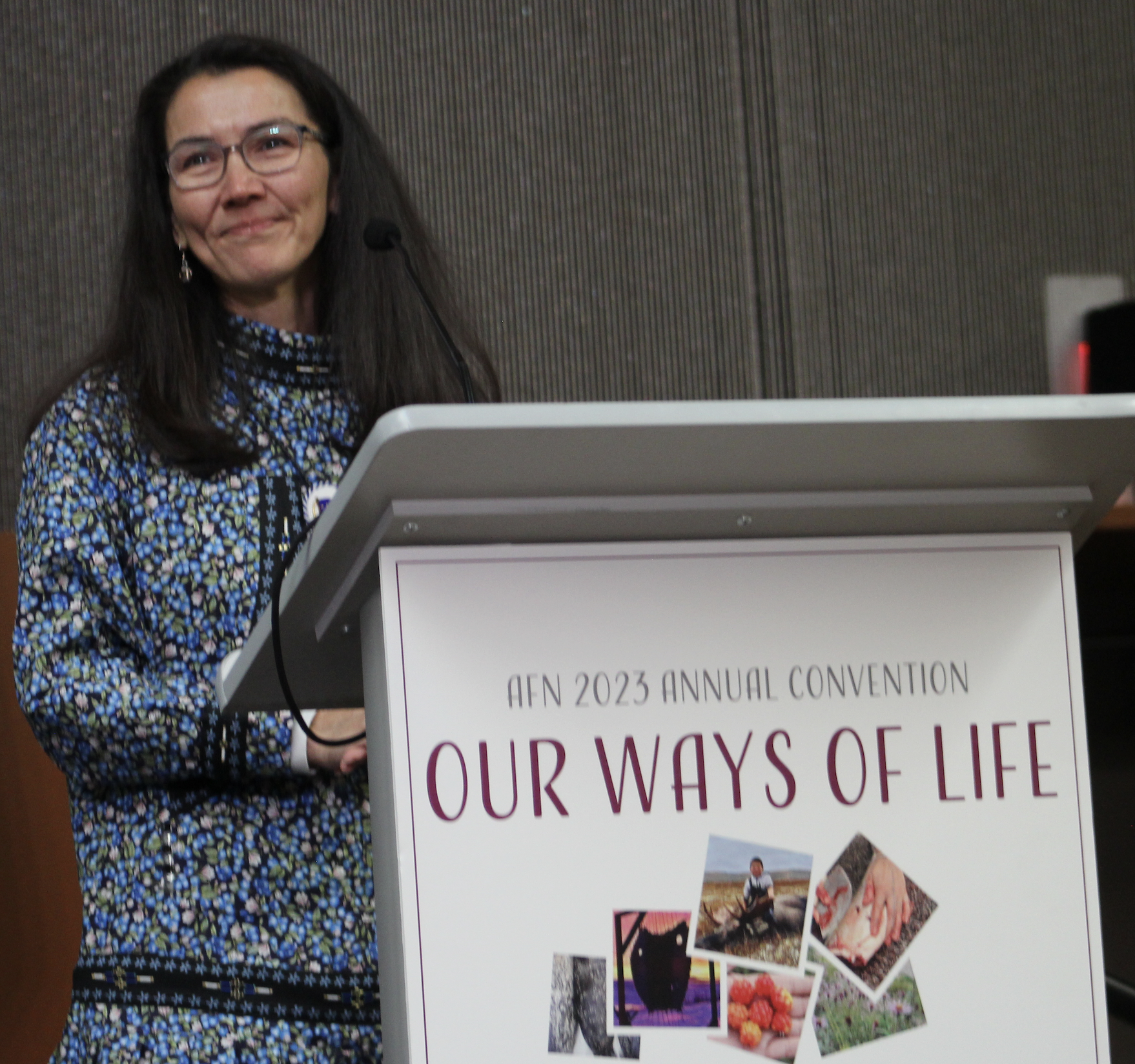
- Details
- By Levi Rickert
ANCHORAGE, Alaska — Rep. Mary Sattler Peltola (D-Alaska), the first Alaska Native to serve in the U.S. Congress, on Saturday was greeted with a standing ovation when she arrived at the podium to address the Alaska Federation of Natives (AFN) convention in Anchorage, Alaska.
The room at the Dena'ina Civic and Convention Center in downtown Anchorage, Alaska was filled with love and adoration for Peltola, whose husband Eugene "Buzzy" Peltola died in a plane crash last month on September 12. Peltola spent over three weeks to be with her family and recntly returned to her work as a congresswoman.
“It was just a year ago I stood before you giving my first address as a member of our congressional delegation. And the welcome was just overwhelming and now a year later…you know,” Pelola said as she teared up and the crowd clapped as if to indicate they shared her grief.
Twenty seconds later, the congresswoman was able to continue talking.
“This convention has always been the highlight of my year. I’m standing here today with all of you. I feel lighter than I have in a long time,” she said.
“The outpouring of love has been so palpable. We can feel it and it is very healing. And it helps us to stay motivated. There are so many rules that our cultures have all laid down for us ho how to grieve in a way where you’re still production and still moving forward,” Peltola said.
She then said she is excited to get back to work and provided a congressional update. Peltola said the Alaska delegation that includes her, Sen. Lisa Murkowsi and Sen. Dan Sullivan, have brought more than $2.5 billion to the state in federal funds.
Peltola is a Democrat and the U.S. senators are Republicans. She said the work together for the sake of the state of Alaska.
“As a delegation, we spend mort of the political spectrum that gives us the unique ability to speak to any member of Congress or member of the administration, whether they are Democrat or Republican. That’s a powerful advantage in a government as divided and polarized as the one we have in America today,” Peltoal said.
She admonished the crowd of Alaska Natives to be united to improve the lives of their people.
“If Alaskan Natives don’t continue to advocate for ourselves, the rest of the country won’t do it for us. We must organize, educate, and both like our way of life depends on it, whether we are from urban centers to the most remote villages>” Peltola said
Peltola todl the crowd it has been the honor of her life to work and serve Alaska in the U.S. House.
“But it’s not my seat; it’s Alaska seat and I can’t take it for granted,” Peltola said asa she concluded her speech and asked for their continued support.
After her address, a five-minute video was shown of family photos that included those of her late husband and the Peltola family.
More Stories Like This
Native News Weekly (August 25, 2024): D.C. BriefsUS Presidents in Their Own Words Concerning American Indians
Indigenous Actor Elaine Miles Reports Detention by Alleged ICE Agents
Happy Thanksgiving from Native News Online
Coming Up on Native Bidaské: Behind the Animation: Joey Clift Talks “Pow” and Native Storytelling
Help us tell the stories that could save Native languages and food traditions
At a critical moment for Indian Country, Native News Online is embarking on our most ambitious reporting project yet: "Cultivating Culture," a three-year investigation into two forces shaping Native community survival—food sovereignty and language revitalization.
The devastating impact of COVID-19 accelerated the loss of Native elders and with them, irreplaceable cultural knowledge. Yet across tribal communities, innovative leaders are fighting back, reclaiming traditional food systems and breathing new life into Native languages. These aren't just cultural preservation efforts—they're powerful pathways to community health, healing, and resilience.
Our dedicated reporting team will spend three years documenting these stories through on-the-ground reporting in 18 tribal communities, producing over 200 in-depth stories, 18 podcast episodes, and multimedia content that amplifies Indigenous voices. We'll show policymakers, funders, and allies how cultural restoration directly impacts physical and mental wellness while celebrating successful models of sovereignty and self-determination.
This isn't corporate media parachuting into Indian Country for a quick story. This is sustained, relationship-based journalism by Native reporters who understand these communities. It's "Warrior Journalism"—fearless reporting that serves the 5.5 million readers who depend on us for news that mainstream media often ignores.
We need your help right now. While we've secured partial funding, we're still $450,000 short of our three-year budget. Our immediate goal is $25,000 this month to keep this critical work moving forward—funding reporter salaries, travel to remote communities, photography, and the deep reporting these stories deserve.
Every dollar directly supports Indigenous journalists telling Indigenous stories. Whether it's $5 or $50, your contribution ensures these vital narratives of resilience, innovation, and hope don't disappear into silence.
 The stakes couldn't be higher. Native languages are being lost at an alarming rate. Food insecurity plagues many tribal communities. But solutions are emerging, and these stories need to be told.
The stakes couldn't be higher. Native languages are being lost at an alarming rate. Food insecurity plagues many tribal communities. But solutions are emerging, and these stories need to be told.
Support independent Native journalism. Fund the stories that matter.
Levi Rickert (Potawatomi), Editor & Publisher

